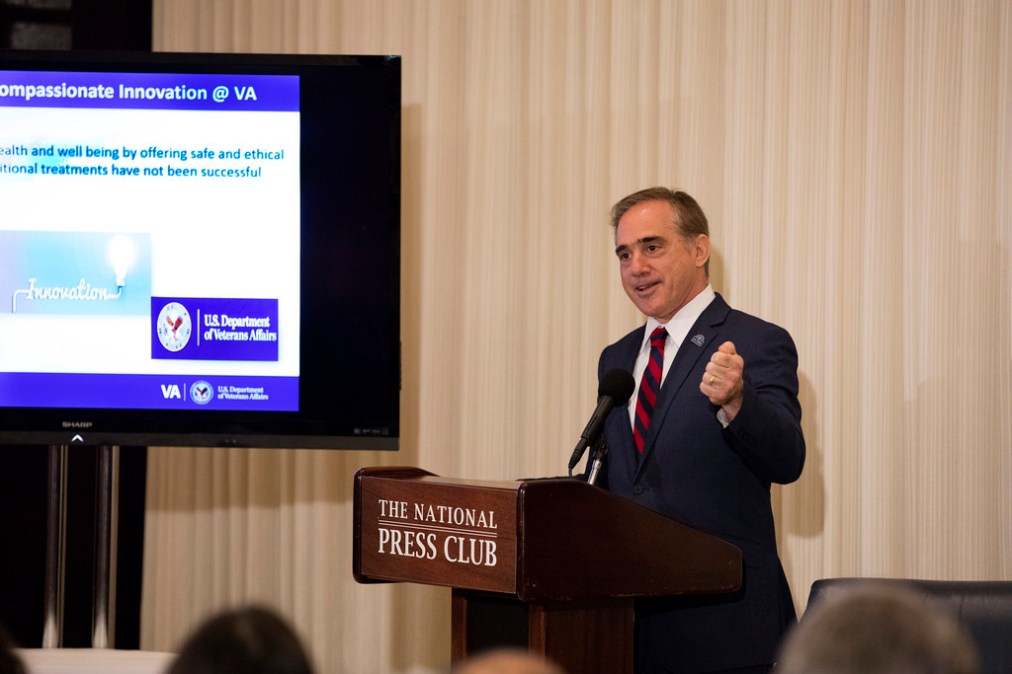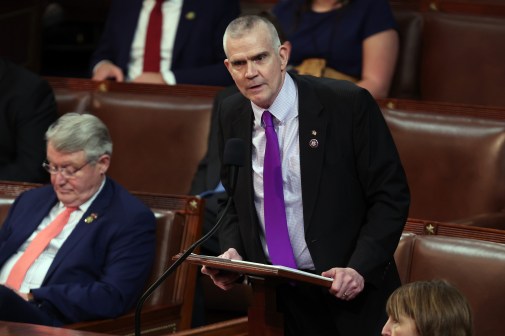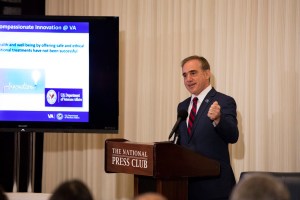VA moving to e-health record system ‘similar’ to Pentagon’s, secretary says

The Department of Veterans Affairs will adopt a similar electronic health record platform to the Defense Department’s MHS GENESIS, built around the commercial off-the-shelf core system Cerner Millennium, Secretary David Shulkin announced Monday.
The VA’s future platform won’t be identical to the Pentagon’s but “similar,” Shulkin said, because “VA has unique needs and many of those are different from the DoD.”
Not only is the decision a “cost-effective” step toward modernizing VA’s electronic health record — currently the Veterans Information Systems and Technology Architecture, or VistA —but it also makes it so the medical records between the department and the DOD will be interoperable.
“VA’s adoption of the same EHR system as DoD will ultimately result in all patient data residing in one common system and enable seamless care between the Departments without the manual and electronic exchange and reconciliation of data between two separate systems,” Shulkin said in a news conference.
While the VA and DOD were able to link their EHRs to share some key aspects of the records with the joint legacy viewer application, “seamless care is fundamentally constrained by ever-changing information sharing standards, separate chains of command, complex governance, separate implementation schedules that must be coordinated to accommodate those changes from separate program offices that have separate funding appropriations, and a host of related complexities requiring constant lifecycle maintenance,” Shulkin said.
“And the bottom line is we still don’t have the ability to trade information seamlessly for our Veteran patients and seamlessly execute a share plan of acre with smooth handoffs,” he said. “Without improved and consistently implemented national interoperability standards, VA and DoD will continue to face significant challenges if the Departments remain on two different systems. ”
In March, Shulkin criticized the VA’s decision not to move to an integrated, modernized electronic health record platform directly aligned with the Pentagon as a “strategic mistake.”
The move is also an opportunity for VA to enhance interoperability with community partners and academic organizations.
“[W]e are embarking on creating something that has not been done before — that is an integrated product that, while utilizing the DoD platform, will require a meaningful integration with other vendors to create a system that serves Veterans in the best possible way,” Shulkin said.
Additionally, the move will help VA bolster the cybersecurity of veterans’ data, he said. “[W]e intend to leverage the architecture, tools and processes that have already been put in place to protect DoD data, to include both physical and virtual separation from commercial clients.
Shortly after his confirmation as secretary in February, Shulkin promised he’d announce VA’s next steps in modernizing VistA by July — either outsourcing that system to the private sector or adopting a COTS system, like the department has chosen to do.
“I said recently to Congress that I was committed to getting VA out of the software business, that I didn’t see remaining in that business as benefitting Veterans,” the secretary said Monday. “And, because of that, we’re making a decision to move towards a commercial off-the-shelf product.”
It took the Pentagon more than two years in its move to the Cerner system, and for that reason, “we simply can’t afford to wait that long when it comes to the health of our Veterans,” Shulkin said, citing a “public interest exception” to waive full and open competition on the contract.
DOD launched its first pilot of MHS GENESIS in February at Fairchild Air Force Base.
Shulkin told reporters at a White House press briefing that it will take three to six months to navigate the contracting process for the award, to include “the implementation plans and the cost of this system so that we can go out and make sure we’re doing this right, and that we have the resources available to do it.”
Also, using DOD’s “planning materials and change management tools” from its transition to the similar platform, he said, “we’ll be able to do it much faster than if we had done it alone,” and faster than DOD did.
In addition to key executives from the Pentagon who helped stand up MHS GENESIS currently working with the VA, White House leadership in the Office of American Innovation also supported Shulkin and the VA in this move, as President Trump tasked it do at its inception.
“They indicated a strong interest in helping the Department of Veterans Affairs, which I welcomed,” he said. “What we talked about is best practices about how industries make quantum changes, how you go out and solicit information from leaders in the field to make sure that you get the right stakeholders and opinions. So they were advisory in this process.”
There is uncertainty still ahead, however. Modernization of VA’s systems, including its EHR, is one of the most costly budget items proposed for fiscal 2018. But the White House requested a $500 million reduction in spending on information technology systems at the department in its budget proposal released last month.
The EHR modernization “will require an initial capital investment that’s not in our fiscal year budget,” Shulkin said at a White House press conference June 1.
“We’ve already begun starting today to engage with the appropriations leadership in both the Senate and the House,” he said. “I will tell you, this is something Congress has been asking for; I believe they will support this.
“This is an exciting new phase for VA, DOD, and for the country. Our mission is too important not to get this right and we will,” Shulkin said.
President Trump called VA’s decision “one of the biggest wins for our veterans in decades. And I congratulate Secretary Shulkin for making this very, very important decision.”





